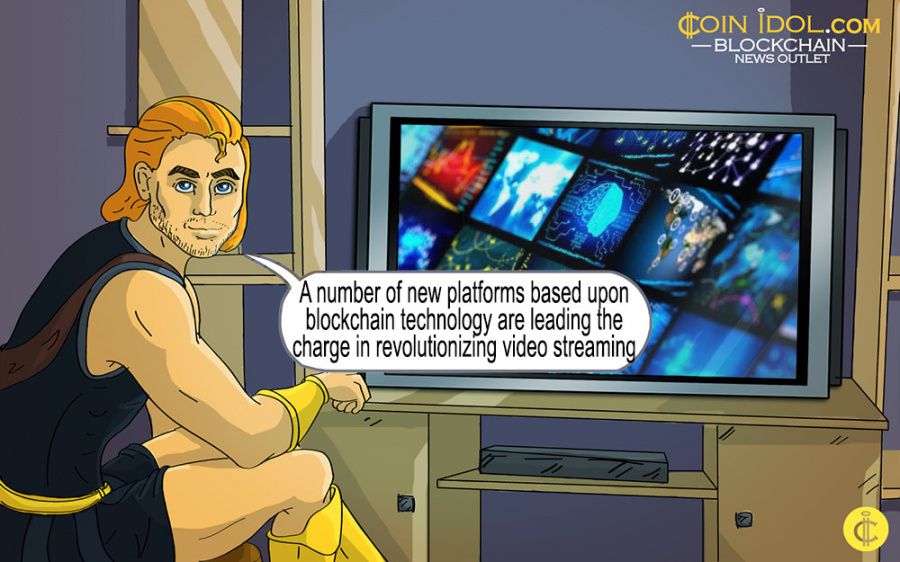Blockchain Technology Leading the Video Streaming Revolution
Updated: Oct 29, 2017 at 07:14

The internet has long been an area where new technology conquers the old. Old modems of 300 baud have been supplanted by ones that offer downloads of up to over 1 gig per second. Such innovations have led to text and still images once being the primary source of internet content being replaced by video streaming services like Netflix and YouTube.
People have become accustomed to being able to stream movies, sports, TV shows, and even funny dog videos onto their smartphones, tablets, and computers with just the click of the mouse or a touch. Yet a change is coming in online video distribution and consumption as the current juggernauts of online video content are stuck in the past with old models of operation. A number of new platforms based upon blockchain technology are leading the charge in revolutionizing video streaming.
Rising Upstarts are Pushing Video Streaming to the Next Level
The online video streaming marketplace will soon be disrupted and altered by new applications that are creating decentralized hubs by the power and flexibility of blockchain technology. Platforms like View.ly, Flixxo, and VirtuTV are seeking to overthrow the old king, YouTube, and transform social video hubs into social economies where everybody wins. Each of these applications takes a different approach to achieve these goals.
View.ly relies upon content creators to power their platform. Content creators serve as the nexus, building up communities of fans who wish to support their work. To this end, creators can set up private channels and subscription services to offer additional content to users who meet various pay thresholds. Creators are also free from any outside interference when it comes to advertising as they can freely enter into any sponsorship deals that they choose.
Flixxo marries the power of blockchain technology with the versatility of peer-to-peer file sharing. The blockchain allows creators to use smart contract technology to determine how much they'll charge for people to view their videos, but they'll also use the smart contract to determine what percentage of revenue they'll set aside for users who become a part of the BitTorrent network by seeding the video content. Advertisers purchase tokens from creators and then create a smart contract where they pay tokens to users who choose to watch their ads.
VirtuTV allows for creators to freely upload any kind of video content that they wish, along with the ability to remain anonymous. Creators earn revenue by users watching their videos as VirtuTV features a pay-per-view system. In addition, users who like the work of specific content creators can make donations to them. Users can choose to be part of the peer-to-peer network and gain tokens by seeding content.
Blockchain Technology Pushing the Evolution of Video Streaming
Technological innovation always paves the way for dramatic changes. Right now, a few juggernauts are ruling the video streaming roost, and the biggest of them all is
YouTube. By offering millions of videos that cover every genre, YouTube is the current video distribution king. Yet the site is aging rapidly as it is stuck in the past from a technological point of view. The site features massive expenses as all of its content has to be stored on servers, and the issue of rewarding content creators is getting increasingly thorny as YouTube continues to alter its rules and demonetize many videos and channels.
The main problem with sites like YouTube is that they're stuck in the past. New innovations, such as blockchain technology, is altering the landscape in many fields, such as finance, records, and, of course, video streaming. The blockchain offers quite a few benefits to online video distribution and consumption, such as smart contract technology. Smart contracts allow for an almost infinite variety in how videos are monetized and shared. Content creators can reward users who choose to seed their content, and users can directly support creators in many different ways: pay-per-view payments, subscriptions, and donations. For creators, the beauty of the blockchain is that revenue goes directly into their wallets. Advertisers can choose to deal directly with users or creators, or perhaps both. Plus, there's a high level of security associated with smart contract technology as it is heavily encrypted and shared globally via a decentralized ledger.
A New Dawn in Video Streaming is Coming
The effect that blockchain technology will have upon video streaming will be profound. The current leaders in online video distribution are not taking advantage of new technology and innovation, but a number of new applications are picking up the gauntlet, such as View.ly, Flixxo, and VirtuTV. Blockchain technology is allowing the creation of decentralized hubs of social video distribution and consumption where users, advertisers, and content creators fully support each other. In this new era of blockchain-based video streaming, everybody wins and not just some faceless corporation.
News
Coin expert
News
Price
Price

(0 comments)